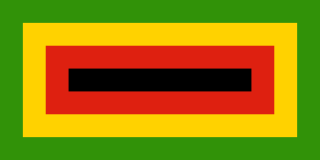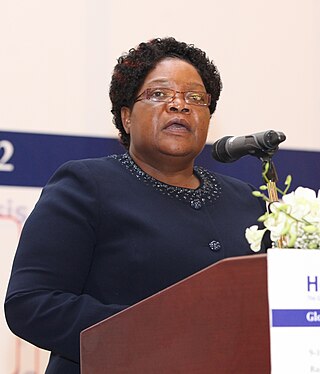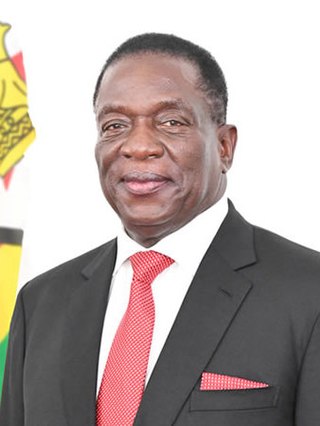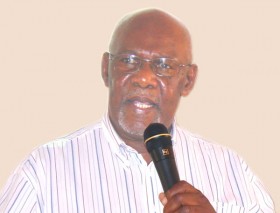Related Research Articles
Simon Vengai Muzenda was a Zimbabwean politician who served as Deputy Prime Minister from 1980 to 1987 and as Vice-President of Zimbabwe from 1987 to 2003 under President Robert Mugabe.

The Zimbabwe African National Union – Patriotic Front (ZANU–PF) is a political organisation which has been the ruling party of Zimbabwe since independence in 1980. The party was led for many years under Robert Mugabe, first as prime minister with the Zimbabwe African National Union (ZANU) and then as president from 1987 after the merger with the Zimbabwe African People's Union (ZAPU) and retaining the name ZANU–PF, until 2017, when he was removed as leader.

The Zimbabwe African National Union (ZANU) was a militant socialist organisation that fought against white-minority rule in Rhodesia, formed as a split from the Zimbabwe African People's Union (ZAPU) in 1963. ZANU split in 1975 into wings loyal to Robert Mugabe and Ndabaningi Sithole, later respectively called ZANU–PF and ZANU–Ndonga. These two sub-divisions ran separately at the 1980 general election, where ZANU–PF has been in power ever since, and ZANU–Ndonga a minor opposition party.

Joice Runaida Mujuru, also known by her nom-de-guerre Teurai Ropa Nhongo, is a Zimbabwean revolutionary and politician who served as Vice-President of Zimbabwe from 2004 to 2014. Previously she had served as a government minister. She also served as Vice-President of ZANU–PF. She was married to Solomon Mujuru until his death in 2011 and was long considered a potential successor to President Robert Mugabe, but in 2014 she was denounced for allegedly plotting against Mugabe. As a result of the accusations against her, Mujuru lost both her post as Vice-President and her position in the party leadership. She was expelled from the party a few months later, after which she formed the new Zimbabwe People First party.
Joram Macdonald Gumbo is a Zimbabwean politician, member of parliament, former member of the Pan-African Parliament from Zimbabwe, and former cabinet minister. He is a member of the Zanu-PF party.

Saviour Kasukuwere is a Zimbabwean politician who served in the government of Zimbabwe as Minister of Local Government, Rural Development and National Housing between October and November 2017. He was also the ZANU–PF party's national political commissar until December 2017. Before that he was Minister of Youth Development, Indigenisation and Empowerment, and Minister of the Environment, Water and Climate. In October 2020, the Zimbabwe government sought Kasukuwere's extradition after issuing a warrant for his arrest. It was revealed that Kasukuwere was among loyalists of former President Robert Mugabe who fled to South Africa before their criminal trials could be completed.

Emmerson Dambudzo Mnangagwa is a Zimbabwean politician who has served as President of Zimbabwe since 24 November 2017. A member of ZANU–PF and a longtime ally of former President Robert Mugabe, he held a series of cabinet portfolios and was Mugabe's Vice-President until November 2017, when he was dismissed before coming to power in a coup d'état. He secured his first full term as president in the disputed 2018 general election. Mnangagwa has been re-elected in 2023 with 52.6% of the votes. Nelson Chamisa came in second with 44%.

Joseph Wilfred Msika, was a Zimbabwean politician who served as Second Vice-President of Zimbabwe from 1999 to 2009.
Articles related to Zimbabwe include:

Dumiso Dabengwa was a Zimbabwean politician. He served as the head of Zimbabwe People's Revolutionary Army (ZIPRA) intelligence during the Rhodesian Bush War.
Sydney Tigere Sekeramayi is a Zimbabwean politician who served in the government of Zimbabwe as Minister of Defence between 2013 and 2017. He has been a minister in the Cabinet since independence in 1980, serving as Minister of Defence from 2001 to 2009 and Minister of State Security from 2009 to 2013.

Didymus Noel Edwin Mutasa is a Zimbabwean politician who served as Zimbabwe's Speaker of Parliament from 1980 to 1990. Subsequently, he held various ministerial posts working under President Robert Mugabe in the President's Office. He was Minister of State for Presidential Affairs from 2009 to 2014 and also served as ZANU-PF's Secretary for Administration.
Patrick Antony Chinamasa is a Zimbabwean politician who served in the government of Zimbabwe as the minister of various cabinet ministries. Previously he served as the Minister of Finance and Investment Promotion and the Minister of Justice, Legal and Parliamentary Affairs.
Sikhanyiso Ndlovu was a Zimbabwean politician who was Minister of Information and Publicity from 2007 to 2008. He was also a member of the ZANU-PF Politburo.

Grace Ntombizodwa Mugabe is a Zimbabwean entrepreneur, politician and the widow of the late President Robert Mugabe. She served as the First Lady of Zimbabwe from 1996 until her husband's resignation in November 2017, a week after he was ousted from power. Starting as a secretary to Mugabe, she rose in the ranks of the ruling ZANU–PF party to become the head of its Women's League and a key figure in the Generation 40 faction. At the same time, she gained a reputation for privilege and extravagance during a period of economic turmoil in the country. She was given the nickname Gucci Grace due to her extravagance. She was expelled from the party, with other G40 members, during the 2017 Zimbabwean coup d'état.
The events of the first and second rounds of the Zimbabwean presidential election, which Robert Mugabe of ZANU-PF won on 27 June 2008 after his challenger, Morgan Tsvangirai of the Movement for Democratic Change (MDC), withdrew from the process and declared it illegitimate, caused reactions from many international bodies. Other Zimbabwean groups have denounced the poll as well
The Government of National Unity refers to Zimbabwe's coalition government that was formed on 13 February 2009 following the inaugurations of Morgan Tsvangirai as Prime Minister and Thokozani Khuphe and Arthur Mutambara as Deputy Prime Ministers. It is a coalition organized among President Robert Mugabe's Zimbabwe African National Union – Patriotic Front, Tsvangirai's Movement for Democratic Change, and Mutambara's MDC, as agreed to during recent negotiations.
Victoria Fikile Chitepo was a South African - Zimbabwean politician, activist and educator. She was the wife of Herbert Chitepo, a leading figure in the Zimbabwe African National Union (ZANU), but was a major political figure in her own right and served as a minister in the government of independent Zimbabwe between 1980–1992.
Patrick Zhuwao is a Zimbabwean businessman, farmer, and politician. He served as Minister of Public Service, Labour and Social Welfare between October and November 2017. He was expelled from the ruling ZANU–PF party during the 2017 Zimbabwean coup d'état.
Beauty Lily Zhuwao is a Zimbabwean politician and the wife of former government minister Patrick Zhuwao. She is also the daughter-in-law of Sabina Mugabe, the sister of former President Robert Mugabe. Prior to 2015, Zhuwao was active in ZANU–PF politics, serving for several years as the Women's League provincial treasurer for Mashonaland West Province.
References
- 1 2 Bhebhe, Ngwabi (11 September 2016). "Dr Muzenda's Educational Escapades". The Sunday Mail.
- ↑ "Zimbabwe Aide Simon Muzenda, 81". Washington Post . 21 September 2003.
- ↑ "Mujuru sworn in as vice president". The New Humanitarian . 6 December 2004.
- ↑ Bhebhe, Ngwabi (2005). Simon Vengai Muzenda and the Struggle for and Liberation of Zimbabwe. Harare, Zimbabwe: Mambo Press. ISBN 978-0869227800.
- ↑ "Parliament Appoints SRCO Members". The Herald . 3 October 2018.
- 1 2 Muchabaiwa, Tapfumaneyi (23 March 2022). "Zim calls for end to Russia-Ukraine war". Newsday .
- 1 2 Tshili, Nqobile (24 August 2021). "Teen pregnancies escalate...as Covid-19 keeps schools closed". The Chronicle .
- ↑ Zharare, Hebert (12 December 2014). "President Unveils New Ministers". Herald (Zimbabwe) .
- ↑ "Validation of the Zimbabwe Sustainable Energy for All (SE4All) Action Agenda". African Development Bank . 27 October 2017.
- ↑ "Beleaguered President Mugabe is fighting pressure for him to retire". Africa Confidential . 11 June 1999.
- 1 2 "Fresh power struggles rock Zanu PF". Zimbabwe Independent . 7 February 2020.
- ↑ Sims, Bryan M.; Masamvu, Sydney; Mirell, Harvey. "Restrictive Measures and Zimbabwe: Political Implications, Economic Impact and a Way Forward" (PDF). Institute for Democratic Alternatives in South Africa . Retrieved 14 May 2022.
- ↑ "EU names Zimbabwe's "blacklist". The New Humanitarian . 25 July 2002.
- ↑ "E.O. 13288 Zimbabwe". United States Department of the Treasury . Federal Government of the United States. 10 March 2003.
- ↑ "European Union - Economic Sanctions - Zimbabwe" (PDF). Lloyd's of London . 7 August 2002.
- ↑ "Issuance of new Zimbabwe Executive Order; Zimbabwe Designations and Designations Updates". United States Department of the Treasury . 23 November 2005.
- ↑ "Betrayal fears after EU sanctions ease on Zimbabwe". The Africa Report . 17 February 2012.
- ↑ "Amendment of the National Emergency with Respect to Zimbabwe". Federal government of the United States . 22 November 2005.